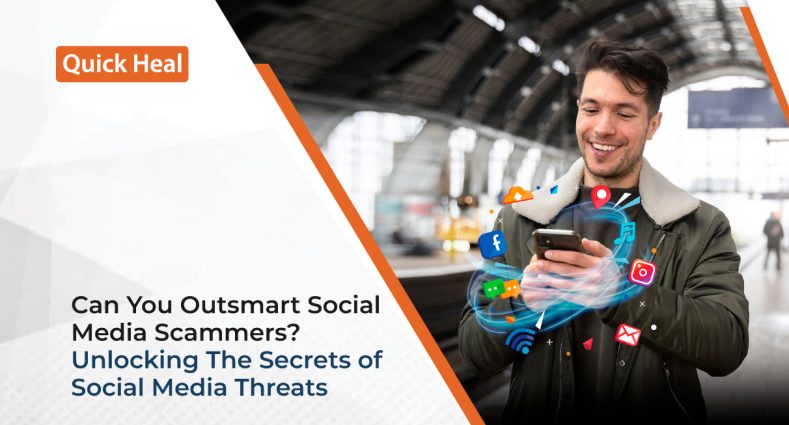Can You Outsmart Social Media Scammers? Unlocking The Secrets of Social Media Scams

Social media scams are like those little troublemakers lurking in the corners of our online lives. We’re all about getting those likes, shares, and follows, but do you know that they can lead us straight into the jaws of online scams?
And get this, they’re not minor inconveniences; they’re big deals impacting millions of folks worldwide. From stealing identities to phishing schemes, these scams are out there, waiting to catch us off guard.
More than 95,000 people reported losing around USD 770 million in 2021 due to fraud that started on social media. Although complaints of these fraudulent activities have increased for all age groups, those between ages 18 and 39 were more susceptible than older persons, reporting more than twice as many financial losses from these scams in 2021.
For example, malicious URLs and a range of romance-themed spam and email scams climbed by 300% while Valentine-related malware threats saw a 25% spike. It was discovered that Valentine’s Day shopping and gift-giving accounted for the majority of these frauds and spam emails.
Attacks and frauds on social media have become widespread. These threat actors come up with creative new ways to trick users and take their data. Social media platforms have over 4.59 billion members globally, cybercrime causes over $3.25 billion in revenue yearly.
Let’s explore the intricacies of social media scams in this article, revealing their tactics, effects, and — above all — how to protect yourself from online fraud.
Unveiling the Diverse Landscape of Social Media Scams
Numerous frauds exist on social media sites, each posing a different risk to the security and privacy of its victims. Here are some of the most popular social media scams that you need to steer clear of:
- Phishing: It involves sending out fraudulent links through emails, postings, or direct messages, which can infect computers with malware or steal login credentials.
- Online Quizzes: Even though the activity seems legitimate, consumers are vulnerable to exploitation because quizzes and games lure them into providing personal information.
- Romance Scams: Scammers use fictitious identities to obtain private information or demand money under pretences.
- E-commerce: Such scams entice consumers to buy goods from phony websites, collect personal information for nefarious uses, and even try to commit banking fraud.
- Charity Scams: These ask for money for fictitious causes to obtain private information from gullible contributors.
- Recruitment Scams: Scammers pretending to be job recruiters use false promises to entice job seekers to divulge personal information.
- Investment Scams: These deceive people by offering large returns. But after they fall for their tricks, they take their money and disappear.
- App Downloads: Scams involving app downloads that appear authentic may entail the download of malicious apps or the sale of user data to unaffiliated parties.
It takes alertness and awareness of warning signs, such as phony profiles, misspelt names, unsolicited money demands, and alluring offers to identify these scams. To guard against social media fraud, be aware and cautious, and employ relevant cybersecurity solutions like Quick Heal.
Safeguarding Against Social Media Scams with Quick Heal Total Security
Strong cybersecurity solutions like Quick Heal Total Security, awareness, and prudence are necessary to protect oneself from social media scams.
- Real-time threat detection: Quick Heal quickly detects and neutralizes possible threats by continuously checking for unusual activity on your devices.
- Web security: Provides safe social media browsing by guarding against phishing attempts and harmful websites.
- Protection against identity theft: Preserves private data, lowering the possibility of falling for scams involving social media.
You can also do these things:
- Stay informed: Learn about typical social media scams, how they operate, and warning signs. The first line of defense against cyber attacks is awareness.
- Exercise caution: Be on the lookout for offers that seem too good to be true, unsolicited messages, and requests for personal information. Follow your gut and exercise prudence.
- Verify authenticity: Be sure the source is reputable before opening links or divulging personal information.
Examine the profile for spelling and language mistakes, consider the age and number of followers, and look out for any unusual activity.
Consider This:
Have you ever experienced any malicious social media activity? Have you ever been a victim of social media scams?
If you want to avoid such scenarios, use Quick Heal Total Security to defend yourself! Quick Heal helps protect you against a variety of cyber threats, including those originating from social media.
Protect your online security, identity theft prevention, and real-time threat monitoring like never before. Check out Quick Heal’s free trial today!
 (Image Source: India Today)
(Image Source: India Today)


No Comments, Be The First!